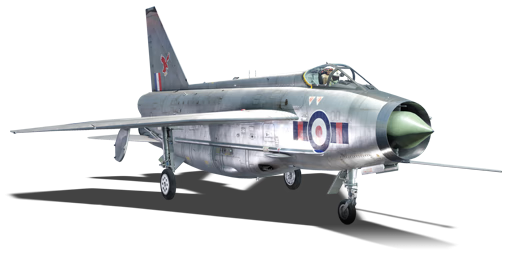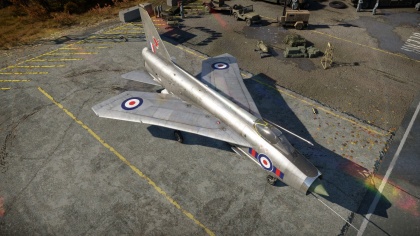Difference between revisions of "Lightning F.6"
m (Fixed the listed wing loading for full fuel using the correct 44.08m² wing area and 18,632 kg full fuel weight listed. Last time I changed this, I mistakenly used the 42.6m² wing area of the Lightning P.1A prototype.) (Tag: Visual edit) |
Inceptor57 (talk | contribs) m (Given wing area of lightning in-game is 42.5 m2 (according to data sheet)) |
||
| Line 75: | Line 75: | ||
|- | |- | ||
| colspan="2" | Rolls-Royce Avon Mk.302 || 2 | | colspan="2" | Rolls-Royce Avon Mk.302 || 2 | ||
| − | | colspan="1" | 14,092 kg || colspan="2" | | + | | colspan="1" | 14,092 kg || colspan="2" | 438 kg/m<sup>2</sup> |
|- | |- | ||
! colspan="3" | Engine characteristics | ! colspan="3" | Engine characteristics | ||
Revision as of 16:57, 29 April 2020
Contents
Description
The Lightning F.6 is a rank VI British jet fighter
with a battle rating of 9.3 (AB/RB) and 9.7 (SB). It was introduced in Update 1.97 "Viking Fury".
General info
Flight performance
Describe how the aircraft behaves in the air. Speed, manoeuvrability, acceleration and allowable loads - these are the most important characteristics of the vehicle.
| Characteristics | Max Speed (km/h at 12,192 m) |
Max altitude (metres) |
Turn time (seconds) |
Rate of climb (metres/second) |
Take-off run (metres) | |||
|---|---|---|---|---|---|---|---|---|
| AB | RB | AB | RB | AB | RB | |||
| Stock | 2,215 | 2,200 | 16000 | 27.9 | 28.2 | 150.7 | 141.4 | 850 |
| Upgraded | 2,386 | 2,290 | 24.4 | 26.0 | 195.3 | 172.0 | ||
Details
| Features | |||||
|---|---|---|---|---|---|
| Combat flaps | Take-off flaps | Landing flaps | Air brakes | Arrestor gear | Drogue chute |
| X | ✓ | ✓ | ✓ | ✓ | ✓ |
| Limits | ||||||
|---|---|---|---|---|---|---|
| Wings (km/h) | Gear (km/h) | Flaps (km/h) | Max Static G | |||
| Combat | Take-off | Landing | + | - | ||
| 1361 | 463 | N/A | 720 | 463 | ~10 | ~6 |
| Optimal velocities (km/h) | |||
|---|---|---|---|
| Ailerons | Rudder | Elevators | Radiator |
| < 850 | < 700 | < 700 | N/A |
Engine performance
| Engine | Aircraft mass | ||||
|---|---|---|---|---|---|
| Engine name | Number | Basic Mass (no fuel) | Wing loading (full fuel) | ||
| Rolls-Royce Avon Mk.302 | 2 | 14,092 kg | 438 kg/m2 | ||
| Engine characteristics | Mass with fuel (no external load) | Max Takeoff Weight | |||
| Weight (each) | Type | 5m fuel | 18m fuel | ||
| 1,310 kg | Afterburning axial-flow turbojet | 15,353 kg | 18,632 kg | 19,000 kg | |
| Maximum engine thrust @ 0 m (RB / SB) | Thrust to weight ratio @ 0 m (100%) | ||||
| Condition | 100% | WEP | 5m fuel | 18m fuel | MTOW |
| Stationary | 5,620 kgf | 7,390 kgf | 0.96 | 0.79 | 0.78 |
| Maximum | 5,700 kgf | 7,400 kgf | 0.96 | 0.79 | 0.78 |
Survivability and armour
In line with its role as a high-performance interceptor aircraft the Lightning F.6 has no armoured plating or bulletproof glass, such additions would have increased the weight of the aircraft, while offering no real benefit for it's intended role.
Most of the inside of the wings (including the flaps) consists of fuel tanks, fuel is also stored in the ventral tank. The top engine is mounted above and to the rear of the bottom engine, this leaves it exposed to enemy fire; on the flip side the bottom engine is shielded from enemy fire by the top engine and wing fuel tanks, this makes is surprisingly resilient to damage, it is not uncommon for it to even continue functioning after the aircraft has been hit by a missile (although the rest of the aircraft will be well and truly broken afterwards).
The large belly tank and high wings of the Lightning mean it is able to survive belly landings very well.
Armaments
Offensive armament
The Lightning F.6 is armed with:
- 2 x 30 mm ADEN cannon, mounted in bell tank (120 RPG = 240 total)
Suspended armament
The Lightning F.6 can be outfitted with the following ordenance:
- Without load
- 2 x Firestreak missiles
- 2 x Red Top missiles
Usage in battles
In combined battles, pilots of the Lightning F.6 may find themselves unable to deal much damage against ground vehicles, especially without the use of rockets, anti-tank missiles, or bombs. As such, this fighter is better suited to dealing with enemy air targets such as helicopters, which are plentiful at the Lightning's battle rating.
Although it faces challenges there, air realistic battles are where the Lightning truly belongs. The F.6 is able to use its Red Top missiles to dispatch enemies from a distance. Best practice with the missiles is to fire when there is about a 1.5 km gap between the F.6 and the enemy aircraft. This gap gives the missile time to lock on its target and track the enemy. One downside to the Red Tops is that they are not particularly fast compared to other missiles at its tier and may have trouble manoeuvring to catch an enemy aircraft travelling at top speed.
The Lightning F.6 handles well at subsonic speeds, although dogfights at those speeds are not common at this battle rating. Flying slowly leaves the pilot vulnerable to nearby enemies. Among those enemies may be the MiG-21 F-13, which the Lightning can often out-dogfight and the F-4C, which the Lightning has an extremely difficult time trying to out-dogfight. The Lightning just doesn't have the energy retention that the Phantom does.
Keeping this in mind, it is advised that pilots use this plane as part of a team, rather than as an attempted solo carry. It is recommended that they climb to higher altitude early on in the match and by gaining as much energy as possible before dumping it in dogfight manoeuvres.
Enemy planes that the Lightning F.6 is well-suited to take on in a fight are the Mitsubishi T-2, the F-100D, and the Mig-19s of all variants.
Modules
The Lightning is a difficult aircraft to use when stock. If you particularly dislike the stock ADEN cannons then you may wish to priorities the cannon upgrades, however generally it is advisable to focus on flight performance and missile upgrades. Once you gain the ability to unlock tier 2 modifications you should probably priorities the Firestreaks, they are far from the best missiles in the game, but they can be useful; after that the new boosters modification is worth getting to improve the general handling of the aircraft. For tier 3 modifications you should get the wing repair and engine upgrades (unless you really want the ADEN upgrades). For tier 4 you will probably want the Red Top missiles for all round better performance than the Firestreaks. After this you can research the rest of the upgrades according to personal preference.
| Tier | Flight performance | Survivability | Weaponry | ||
|---|---|---|---|---|---|
| I | Fuselage repair | Offensive 30 mm | |||
| II | New boosters | Compressor | Airframe | Firestreak | |
| III | Wings repair | Engine | New 30 mm cannons | ||
| IV | G-Suit | Cover | Red Top | ||
Pros and cons
Pros:
- Surprisingly good turn rate between 800 - 1,000 km/h indicated airspeed (IAS)
- Red Top missiles have good seeker gimballing, high-G overload, and an all-aspect capability with radar lock-on (slaving)
- Armed with a pair of powerful ADEN cannons
- Good climb rate and acceleration
Cons:
- A large target for enemy aircraft to target
- Pulls a high angle of attack and loses speed in turns
- Below average roll rate
- Limited armament selection, shoehorned more into an air-to-air combat role
- Sacrifices maneuverability for sheer speed
- Relatively low top speed (1,280 km/h IAS at sea level)
History
Describe the history of the creation and combat usage of the aircraft in more detail than in the introduction. If the historical reference turns out to be too long, take it to a separate article, taking a link to the article about the vehicle and adding a block "/History" (example: https://wiki.warthunder.com/(Vehicle-name)/History) and add a link to it here using the main template. Be sure to reference text and sources by using <ref></ref>, as well as adding them at the end of the article with <references />. This section may also include the vehicle's dev blog entry (if applicable) and the in-game encyclopedia description (under === In-game description ===, also if applicable).
Media
See also
Links to the articles on the War Thunder Wiki that you think will be useful for the reader, for example:
- reference to the series of the aircraft;
- links to approximate analogues of other nations and research trees.
External links
| The English Electric Company Limited | |
|---|---|
| Jet Fighters | Lightning F.6 · Lightning F.53 |
| Jet Bombers | Canberra B Mk 2 · Canberra B (I) Mk 6 |
| Tanks | Excelsior |
| The English Electric Company allowed the Glenn L. Martin Company to license-build Canberra bombers for the United States Air Force. | |
| Britain jet aircraft | |
|---|---|
| Blackburn | Buccaneer S.1 · Buccaneer S.2 · Buccaneer S.2B |
| British Aerospace | Harrier GR.7 · Sea Harrier FRS.1 (e) · Sea Harrier FRS.1 · Sea Harrier FA 2 |
| British Aircraft Corporation | Strikemaster Mk.88 |
| English Electric | Canberra B Mk 2 · Canberra B (I) Mk 6 · Lightning F.6 · Lightning F.53 |
| Gloster | Meteor F Mk 3 · Sea Meteor F Mk 3 · Meteor F Mk 4 G.41F · Meteor F Mk 4 G.41G · Meteor F Mk 8 G.41K · Meteor F Mk.8 Reaper |
| Javelin F.(A.W.) Mk.9 | |
| de Havilland | Vampire F.B.5 · Venom FB.4 · Sea Venom FAW 20 · Sea Vixen F.A.W. Mk.2 |
| Hawker | Sea Hawk FGA.6 · Hunter F.1 · Hunter F.6 · Hunter FGA.9 · Harrier GR.1 · Harrier GR.3 |
| Panavia | Tornado GR.1 · Tornado GR.4 · Tornado F.3 · Tornado F.3 Late |
| SEPECAT | Jaguar GR.1 · Jaguar GR.1A · Jaguar IS |
| Supermarine | Attacker FB 1 · Attacker FB.2 · Scimitar F Mk.1 · Swift F.1 · Swift F.7 |
| Foreign | Phantom FG.1 (USA) · Phantom FGR.2 (USA) · F-4J(UK) Phantom II (USA) |
| Australia | F-111C |
| India | ▄MiG-21 Bison |
| South Africa | ▄JAS39C |





